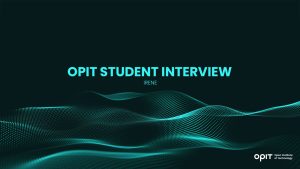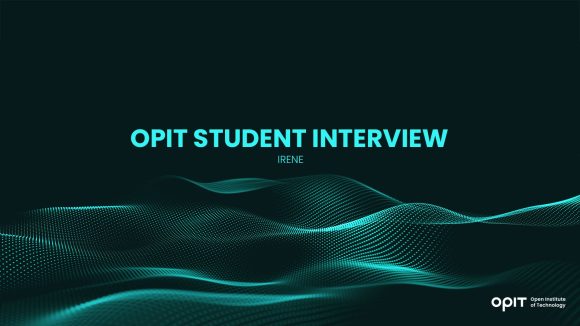

During the Open Institute of Technology’s (OPIT) 2025 graduation day, the OPIT team interviewed graduating student Irene about her experience with the MSc in Applied Data Science and AI. The interview focused on how Irene juggled working full-time with her study commitments and the value of the final Capstone project, which is part of all OPIT’s master’s programs.
Irene, a senior developer at ReActive, said she chose to study at OPIT to update her skills for the current and future job market.
OPIT’s MSc in Applied Data Science and AI
In her interview, Irene said she appreciated how OPIT’s course did not focus purely on the hard mathematics behind technologies such as AI and cloud computing, but also on how these technologies can be applied to real business challenges.
She said she appreciated how the course gave her the skills to explain to stakeholders with limited technical knowledge how technology can be leveraged to solve business problems, but it also equipped her to engage with technical teams using their language and jargon. These skills help graduates bridge the gap between management and technology to drive innovation and transformation.
Irene chose to continue working full-time while studying and appreciated how her course advisor helped her plan her study workload around her work commitments “down to the minute” so that she never missed a deadline or was overcome by excessive stress.
She said she would recommend the program to people at any stage in their career who want to adapt to the current job market. She also praised the international nature of the program, in terms of both the faculty and the cohort, as working beyond borders promises to be another major business trend in the coming years.
Capstone Project
Irene described the most fulfilling part of the program as the final Capstone project, which allowed her to apply what she had learned to a real-life challenge.
The Capstone Project and Dissertation, also called the MSc Thesis, is a significant project aimed at consolidating skills acquired during the program through a long-term research project.
Students, with the help of an OPIT supervisor, develop and realize a project proposal as part of the final term of their master’s journey, investigating methodological and practical aspects in program domains. Internships with industrial partners to deliver the project are encouraged and facilitated by OPIT’s staff.
The Capstone project allows students to demonstrate their mastery of their field and the skills they’ve learned when talking to employers as part of the hiring process.
Capstone Project: AI Meets Art
Irene’s Capstone project, “Call Me VasarAI: An AI-Powered Framework for Artwork Recognition and Storytelling,” focused on using AI to bridge the gap between art and artificial intelligence over time, enhancing meaning through contextualization. She developed an AI-powered platform that allows users to upload a work of art and discover the style (e.g. Expressionism), the name of the artist, and a description of the artwork within an art historical context.
Irene commented on how her supervisor helped her fine-tune her ideas into a stronger project and offered continuous guidance throughout the process with weekly progress updates. After defending her thesis in January, she noted how the examiners did not just assess her work but guided her on what could be next.
Other Example Capstone Projects
Irene’s success is just one example of a completed OPIT Capstone project. Below are further examples of both successful projects and projects currently underway.
Elina delivered her Capstone project on predictive modeling of natural disasters using data science and machine learning techniques to analyze global trends in natural disasters and their relationships with climate change-related and socio-economic factors.
According to Elina: “This hands-on experience has reinforced my theoretical and practical abilities in data science and AI. I appreciate the versatility of these skills, which are valuable across many domains. This project has been challenging yet rewarding, showcasing the real-world impact of my academic learning and the interdisciplinary nature of data science and AI.”
For his Capstone project, Musa worked on finding the optimal pipeline to fine-tune a language learning model (LLM) based on the specific language and model, considering EU laws on technological topics such as GDPR, DSA, DME, and the AI Act, which are translated into several languages.
Musa stated: “This Capstone project topic aligns perfectly with my initial interests when applying to OPIT. I am deeply committed to developing a pipeline in the field of EU law, an area that has not been extensively explored yet.”
Tamas worked with industry partner Solergy on his Capstone project, working with generative AI to supercharge lead generation, boost SEO performance, and deliver data-driven marketing insights in the realm of renewable energy.
OPIT’s Master’s Courses
All of OPIT’s master’s courses include a final Capstone project to be completed over one 13-week term in the 90 ECTS program and over two terms in the 120 ECTS program.
The MSc in Digital Business and Innovation is designed for professionals who want to drive digital innovation in both established companies and new digital-native contexts. It covers digital business foundations and the applications of new technologies in business contexts. It emphasizes the use of AI to drive innovation and covers digital entrepreneurship, digital product management, and growth hacking.
The MSc in Responsible Artificial Intelligence combines technical expertise with a focus on the ethical implications of modern AI. It focuses on real-world applications in areas like natural language processing and industry automation, with a focus on sustainable AI systems and environmental impact.
The MSc in Enterprise Cybersecurity prepares students to fulfill the market need for versatile cybersecurity solutions, emphasizing hands-on experience and soft-skills development.
The MSc in Applied Data Science and AI focuses on the intersection between management and technology. It covers the underlying fundamentals, methodologies and tools needed to solve real-life business problems that can be approached using data science and AI.
Related posts

Source:
- Times of Malta, published on September 18th, 2025
4 min read
The gathering brought together academics and technology leaders from prominent European Institutions, such as Instituto de Empresa (IE University), OPIT itself and the Royal College of Arts, to explore how artificial intelligence is reshaping the university experience.
The OPIT AI Copilot has been trained on the institute’s complete academic archive, a collection created over the past three years that includes 131 courses, more than 3,500 hours of recorded lectures, 7,500 study resources, 320 certified assessments, and thousands of exercises and original learning documents.
Unlike generic AI tools, the Copilot is deeply integrated with OPIT’s learning management system, allowing it to track each student’s progress and provide tailored support.
This integration means the assistant can reference relevant sources within the learning environment, adapt to the student’s stage of study, and ensure that unreleased course content remains inaccessible.
A mobile app is also scheduled for release this autumn, that will allow students to download exercise and access other tools.
During examinations, the Copilot automatically switches to what the institute calls an “anti-cheating mode”, restricting itself to general research support rather than providing direct answers.
For OPIT’s international community of 500 students from nearly 100 countries, many of whom balance studies with full-time work, the ability to access personalised assistance at any time of day is a key advantage.
“Eighty-five per cent of students are already using large language models in some way to study,” said OPIT founder and director Riccardo Ocleppo. “We wanted to go further by creating a solution tailored to our own community, reflecting the real experiences of remote learners and working professionals.”
Tool aims to cut correction time by 30%
The Copilot will also reduce administrative burdens for faculty. It can help grade assignments, generate new educational materials, and create rubrics that allow teachers to cut correction time by as much as 30 per cent.
According to OPIT, this will free up staff to dedicate more time to teaching and direct student engagement.
At the Milan event, Rector Francesco Profumo underlined the broader implications of AI in higher education. “We are in the midst of a deep transformation, where AI is no longer just a tool: it is an environment that radically changes how we learn, teach, and create,” he said.
“But it is not a shortcut. It is a cultural, ethical, and pedagogical challenge, and to meet it we must have the courage to rethink traditional models and build bridges between human and artificial intelligence.”
OPIT was joined on stage by representatives from other leading institutions, including Danielle Barrios O’Neill of the Royal College of Art, who spoke about the role of AI in art and creativity, and Francisco Machin of IE University, who discussed applications in business and management education.
OPIT student Asya Mantovani, also employed at a leading technology and consulting firm in Italy, gave a first-hand account of balancing professional life with online study.
The assistant has been in development for the past eight months, involving a team of OPIT professors, researchers, and engineers.
Ocleppo stressed that OPIT intends to make its AI innovations available beyond its own institution. “We want to put technology at the service of higher education,” he said.
“Our goal is to develop solutions not only for our own students, but also to share with global institutions eager to innovate the learning experience in a future that is approaching very quickly.”

From personalization to productivity: AI at the heart of the educational experience.
Click this link to read and download the e-book.
At its core, teaching is a simple endeavour. The experienced and learned pass on their knowledge and wisdom to new generations. Nothing has changed in that regard. What has changed is how new technologies emerge to facilitate that passing on of knowledge. The printing press, computers, the internet – all have transformed how educators teach and how students learn.
Artificial intelligence (AI) is the next game-changer in the educational space.
Specifically, AI agents have emerged as tools that utilize all of AI’s core strengths, such as data gathering and analysis, pattern identification, and information condensing. Those strengths have been refined, first into simple chatbots capable of providing answers, and now into agents capable of adapting how they learn and adjusting to the environment in which they’re placed. This adaptability, in particular, makes AI agents vital in the educational realm.
The reasons why are simple. AI agents can collect, analyse, and condense massive amounts of educational material across multiple subject areas. More importantly, they can deliver that information to students while observing how the students engage with the material presented. Those observations open the door for tweaks. An AI agent learns alongside their student. Only, the agent’s learning focuses on how it can adapt its delivery to account for a student’s strengths, weaknesses, interests, and existing knowledge.
Think of an AI agent like having a tutor – one who eschews set lesson plans in favour of an adaptive approach designed and tweaked constantly for each specific student.
In this eBook, the Open Institute of Technology (OPIT) will take you on a journey through the world of AI agents as they pertain to education. You will learn what these agents are, how they work, and what they’re capable of achieving in the educational sector. We also explore best practices and key approaches, focusing on how educators can use AI agents to the benefit of their students. Finally, we will discuss other AI tools that both complement and enhance an AI agent’s capabilities, ensuring you deliver the best possible educational experience to your students.
Have questions?
Visit our FAQ page or get in touch with us!
Write us at +39 335 576 0263
Get in touch at hello@opit.com
Talk to one of our Study Advisors
We are international
We can speak in:
